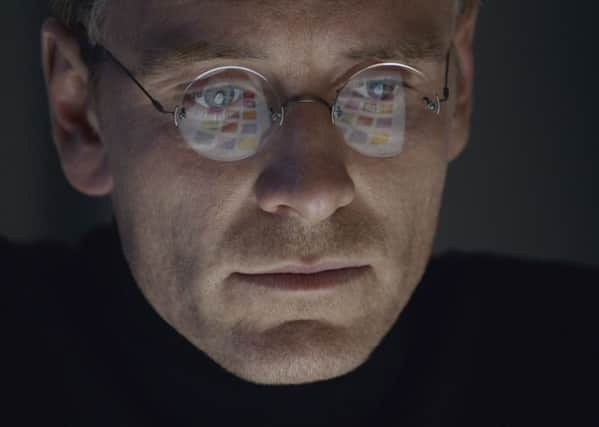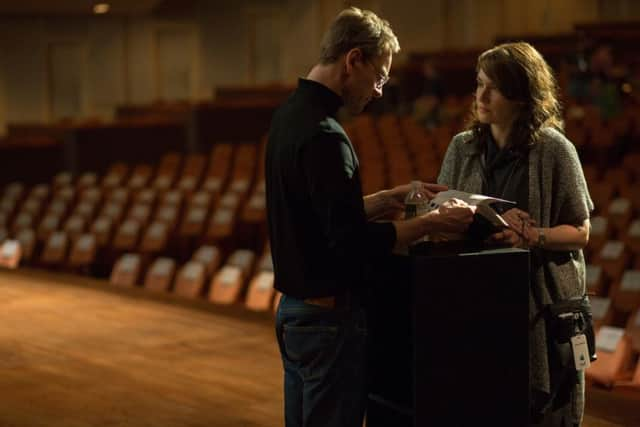Film review: Steve Jobs


It’s important to say from the offset that Danny Boyle’s Steve Jobs is not a traditional biopic, despite the biopic-sounding title and the fact that it’s based on Walter Isaacson’s 2011 biography of the titular Apple genius.
Instead, Aaron Sorkin’s innovative screenplay is split into three acts, set across three different time periods, with Jobs (Michael Fassbender) interacting with six of the key people in his life in the minutes prior to three separate product launches. What emerges is a compelling and entertaining portrait of a complex and often difficult man, anchored by an awards-worthy central performance from Fassbender.
Advertisement
Hide AdAdvertisement
Hide AdThe film opens in 1984, with Jobs about to launch the Macintosh. As the seconds tick away (each act unfolds more or less in real time), he clashes with a handful of characters, including co-founder Steve Wozniak (Seth Rogen), Apple CEO John Sculley (Jeff Daniels), marketing exec and de facto confidante Joanna Hoffman (Kate Winslet), software developer Andy Hertzfeld (Michael Stuhlbarg) and ex-girlfriend Chrisann Brennan (Katherine Waterston), who demands that he acknowledge the paternity of his five year-old daughter, Lisa (Makenzie Moss).
The subsequent acts take place in 1988 (the NeXT launch) and 1998 (the iMac launch) respectively, freeing the film from the confines of the traditional biopic and making it clear that it’s not going to be covering, say, the Pixar years, the iPhone or even Jobs’ battle with the cancer that ultimately killed him in 2011.
Instead, Sorkin’s screenplay takes obvious dramatic licence, using Jobs’ evolving relationships with the same core group of people (with a slightly forced emotional focus on his daughter, played by Ripley Sobo then Perla Haney-Jardine) to offer an insight into his personality and the driving force behind his genius, which often came at the expense of his personal relationships.
Fassbender delivers a magnetic performance that’s full of energy, ensuring that, like the characters on-screen, you’re pulled along irresistibly in Jobs’ wake, despite the fact that his actions are often deeply unsympathetic, as he alienates seemingly everyone around him in his tireless pursuit of perfection.
Advertisement
Hide AdAdvertisement
Hide AdThe supporting cast are equally good, particularly Rogen, who gives one of his best performances to date as Wozniak (displaying the warmth and compassion that Jobs himself sorely lacks) and Daniels (no stranger to Sorkin’s rapid-fire dialogue after three seasons of The Newsroom), while Winslet is extremely engaging as Hoffman, despite a Polish accent that only appears once someone reminds her that she’s Polish (and then gets more Polish with each successive scene).


Boyle reigns in some of his usual directorial tricks in favour of achieving a dynamic momentum that perfectly complements Sorkin’s fast-paced script – needless to say, the film is stuffed with the writer’s trademarked walking-and-talking scenes.
He’s aided by Elliot Graham’s skilful editing, particularly during a breathtaking sequence that intercuts both a current conversation and a flashback conversation with Daniels’ character. In addition, Alwin H. Küchler’s cinematography adds an inspired touch by shooting on a different stock for each time period – 16mm for 1984, 35mm for 1988 and digital for 1998.
In short, this is a brilliantly structured, impressively directed and superbly acted drama that paints a riveting, warts-and-all portrait of a modern-day genius. As a side note, it would be fascinating to see the film adapted into a play.
Steve Jobs is released in cinemas on Friday, November 13